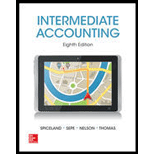
INTERMEDIATE ACCOUNTING
8th Edition
ISBN: 9780078025839
Author: J. David Spiceland
Publisher: McGraw-Hill Education
expand_more
expand_more
format_list_bulleted
Concept explainers
Textbook Question
Chapter 12, Problem 12.22Q
Define a financial instrument. Provide three examples of current liabilities that represent financial instruments.
Expert Solution & Answer
Want to see the full answer?
Check out a sample textbook solution
Students have asked these similar questions
What three factors influence the dollar amount reportedfor liabilities?
Define both current liabilities and current assets. In what ways are they related?
Define Debt-to-assets ratio
Chapter 12 Solutions
INTERMEDIATE ACCOUNTING
Ch. 12 - Prob. 12.1QCh. 12 - When market rates of interest rise after a...Ch. 12 - Does GAAP distinguish between fair values that are...Ch. 12 - When a debt investment is acquired to be held for...Ch. 12 - Prob. 12.5QCh. 12 - What is comprehensive income? Its composition...Ch. 12 - Why are holding gains and losses treated...Ch. 12 - Prob. 12.8QCh. 12 - Prob. 12.9QCh. 12 - Prob. 12.10Q
Ch. 12 - Prob. 12.11QCh. 12 - Prob. 12.12QCh. 12 - Do U.S. GAAP and IFRS differ in the amount of...Ch. 12 - Under what circumstances is the equity method used...Ch. 12 - The equity method has been referred to as a...Ch. 12 - In the application of the equity method, how...Ch. 12 - Prob. 12.17QCh. 12 - Prob. 12.18QCh. 12 - Prob. 12.19QCh. 12 - How does IFRS differ from U.S. GAAP with respect...Ch. 12 - What is the effect of a company electing the fair...Ch. 12 - Define a financial instrument. Provide three...Ch. 12 - Some financial instruments are called derivatives....Ch. 12 - Prob. 12.24QCh. 12 - Prob. 12.25QCh. 12 - Prob. 12.26QCh. 12 - (Based on Appendix 12B) Reporting an investment at...Ch. 12 - Prob. 12.28QCh. 12 - Explain how the CECL model (introduced in ASU No....Ch. 12 - Prob. 12.1BECh. 12 - Prob. 12.2BECh. 12 - Available -for-sale securities LO12-4 SL...Ch. 12 - Prob. 12.4BECh. 12 - Prob. 12.5BECh. 12 - Prob. 12.6BECh. 12 - Prob. 12.7BECh. 12 - Prob. 12.8BECh. 12 - Prob. 12.9BECh. 12 - Prob. 12.10BECh. 12 - Prob. 12.11BECh. 12 - Prob. 12.12BECh. 12 - Prob. 12.13BECh. 12 - Prob. 12.14BECh. 12 - Prob. 12.15BECh. 12 - Prob. 12.16BECh. 12 - Prob. 12.17BECh. 12 - Prob. 12.18BECh. 12 - Prob. 12.1ECh. 12 - Prob. 12.2ECh. 12 - Prob. 12.3ECh. 12 - Prob. 12.4ECh. 12 - Prob. 12.5ECh. 12 - Prob. 12.6ECh. 12 - Prob. 12.7ECh. 12 - Prob. 12.8ECh. 12 - Prob. 12.9ECh. 12 - Prob. 12.10ECh. 12 - Prob. 12.11ECh. 12 - Prob. 12.12ECh. 12 - Prob. 12.13ECh. 12 - Prob. 12.14ECh. 12 - Prob. 12.15ECh. 12 - Prob. 12.16ECh. 12 - Prob. 12.17ECh. 12 - Prob. 12.18ECh. 12 - Prob. 12.19ECh. 12 - Prob. 12.20ECh. 12 - Prob. 12.21ECh. 12 - Prob. 12.22ECh. 12 - Prob. 12.23ECh. 12 - Prob. 12.24ECh. 12 - Prob. 12.25ECh. 12 - Prob. 12.26ECh. 12 - Prob. 12.27ECh. 12 - Prob. 12.28ECh. 12 - Prob. 12.29ECh. 12 - Prob. 12.30ECh. 12 - Prob. 12.31ECh. 12 - Prob. 1CPACh. 12 - Prob. 2CPACh. 12 - Prob. 3CPACh. 12 - Prob. 4CPACh. 12 - Prob. 5CPACh. 12 - Prob. 6CPACh. 12 - Prob. 7CPACh. 12 - Prob. 8CPACh. 12 - Prob. 9CPACh. 12 - Prob. 10CPACh. 12 - Prob. 11CPACh. 12 - Prob. 12CPACh. 12 - Prob. 13CPACh. 12 - Prob. 1CMACh. 12 - Prob. 2CMACh. 12 - Prob. 3CMACh. 12 - Prob. 12.1PCh. 12 - Prob. 12.2PCh. 12 - Prob. 12.3PCh. 12 - Prob. 12.4PCh. 12 - Prob. 12.5PCh. 12 - Prob. 12.6PCh. 12 - Prob. 12.7PCh. 12 - Prob. 12.8PCh. 12 - Prob. 12.9PCh. 12 - Prob. 12.10PCh. 12 - Prob. 12.11PCh. 12 - Prob. 12.12PCh. 12 - Prob. 12.13PCh. 12 - P 12–14
Classifying investments
LO12–1 through...Ch. 12 - Prob. 12.15PCh. 12 - Prob. 12.16PCh. 12 - Prob. 12.17PCh. 12 - Prob. 12.18PCh. 12 - Prob. 12.1BYPCh. 12 - Prob. 12.2BYPCh. 12 - Case 12–4
Accounting for debt and equity...Ch. 12 - Prob. 12.6BYPCh. 12 - Prob. 12.7BYP
Knowledge Booster
Learn more about
Need a deep-dive on the concept behind this application? Look no further. Learn more about this topic, accounting and related others by exploring similar questions and additional content below.Similar questions
- Which ratio measures the ability to pay current liabilities with current assets?a. Debt ratiob. Current ratioc. Liability ratiod. Asset ratioarrow_forwardList four examples of interest-bearing liability accounts commonlyfound in balance sheets. What characteristics do these liabilities have in common? Howdo they differ?arrow_forwardLiabilities are classified on the balance sheet as current or Select one: a. long-term. b. accrued. C. unearned. d. deferred.arrow_forward
arrow_back_ios
SEE MORE QUESTIONS
arrow_forward_ios
Recommended textbooks for you
- Principles of Accounting Volume 1AccountingISBN:9781947172685Author:OpenStaxPublisher:OpenStax College
 Cornerstones of Financial AccountingAccountingISBN:9781337690881Author:Jay Rich, Jeff JonesPublisher:Cengage Learning
Cornerstones of Financial AccountingAccountingISBN:9781337690881Author:Jay Rich, Jeff JonesPublisher:Cengage Learning Intermediate Accounting: Reporting And AnalysisAccountingISBN:9781337788281Author:James M. Wahlen, Jefferson P. Jones, Donald PagachPublisher:Cengage Learning
Intermediate Accounting: Reporting And AnalysisAccountingISBN:9781337788281Author:James M. Wahlen, Jefferson P. Jones, Donald PagachPublisher:Cengage Learning  College Accounting (Book Only): A Career ApproachAccountingISBN:9781337280570Author:Scott, Cathy J.Publisher:South-Western College Pub
College Accounting (Book Only): A Career ApproachAccountingISBN:9781337280570Author:Scott, Cathy J.Publisher:South-Western College Pub

Principles of Accounting Volume 1
Accounting
ISBN:9781947172685
Author:OpenStax
Publisher:OpenStax College

Cornerstones of Financial Accounting
Accounting
ISBN:9781337690881
Author:Jay Rich, Jeff Jones
Publisher:Cengage Learning

Intermediate Accounting: Reporting And Analysis
Accounting
ISBN:9781337788281
Author:James M. Wahlen, Jefferson P. Jones, Donald Pagach
Publisher:Cengage Learning

College Accounting (Book Only): A Career Approach
Accounting
ISBN:9781337280570
Author:Scott, Cathy J.
Publisher:South-Western College Pub
The KEY to Understanding Financial Statements; Author: Accounting Stuff;https://www.youtube.com/watch?v=_F6a0ddbjtI;License: Standard Youtube License